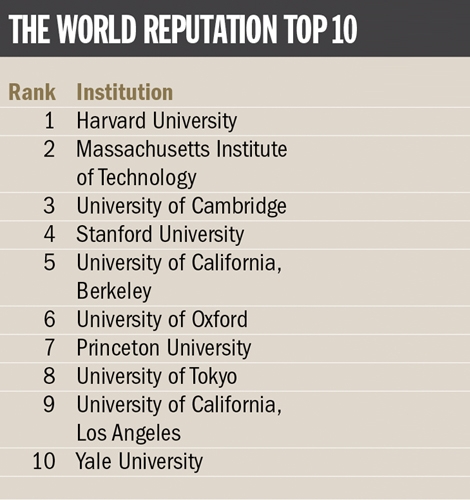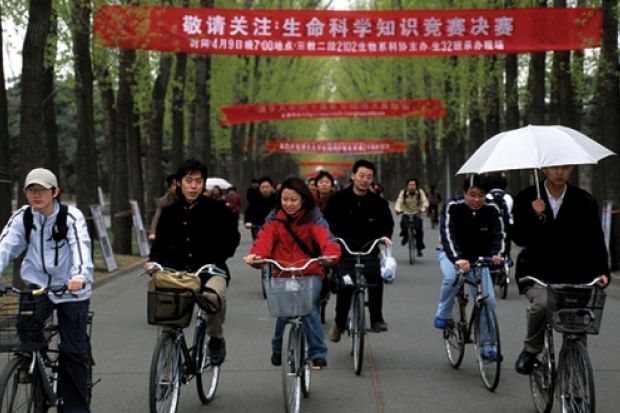Two UK institutions have dropped out of Times Higher Education's academic prestige top 100 in the face of increased competition from Asia and mainland Europe.
Harvard University tops the Times Higher Education World Reputation Rankings, published on 15 March, followed by the Massachusetts Institute of Technology and the University of Cambridge - an unchanged top three from last year's inaugural survey.
Stanford University leapfrogs its neighbour, the University of California, Berkeley, to take fourth spot, while the University of Oxford completes an elite group of six "super brands".
The US dominates the rankings, based on a worldwide poll of more than 17,500 academics, with 44 universities in the global top 100, followed by the UK with 10 institutions. However, both nations have ceded ground to universities in East Asia and continental Europe.
Imperial College London, University College London, the University of Edinburgh and the University of Bristol have all slipped down the table, and the University of Sheffield and the London School of Hygiene and Tropical Medicine have both exited the top 100.
Meanwhile, Chinese universities performed well, with Tsinghua University up to 30th from 35th place and Peking University rising to 38th from 43rd.
The University of Hong Kong, National Taiwan University and the National University of Singapore all rose this year, while Japan has five institutions in the top 100.
Germany's top universities, led by Ludwig-Maximilians University Munich (up from 48th to 42nd), have also enjoyed a rise in overall prestige, following increased investment from the German government's Excellence Initiative.
New entrants include the Hebrew University of Jerusalem, in Israel, the University of São Paulo, in Brazil, and the Middle East Technical University, in Turkey.
Philip Altbach, director of the Center for International Higher Education at Boston College, said the rise of Asian universities in the rankings reflected their growing standing globally.
"As [they] receive more attention in the media and more academic leaders globally have a chance to visit countries such as China, universities in the region are likely to become better known," he said.
But Wendy Piatt, director general of the Russell Group of large research-intensive universities - which represents all 10 UK entries in the top 100 - suggested that the rise of other countries' institutions reflected greater state investment in higher education.
"The UK's leading universities punch well above their weight, and their global reputation remains very strong," she said. "But we are concerned that our global competitors in the US, East Asia and Europe are pumping billions into higher education, and money really matters.
"If the UK is to remain a global leader in higher education, the government must concentrate investment where it will have the most impact: in our world-class research-intensive universities."
Sally Hunt, general secretary of the University and College Union, said "ill-thought-through" government policy meant that the sector was in the grip of "funding uncertainty". "Our brilliant universities need secure and sustained funding if we are to maintain our proud international position," she said.
Phil Baty, editor of the Times Higher Education rankings, said: "While top reputations can take many years, even centuries to build, in today's information-rich and interconnected world, universities cannot sit back and rely on their history. New forces are emerging and signs of declining performance are quickly identified, shared and spread. Established reputations can be highly vulnerable.
"Our data provide clear evidence that in terms of prestige among academics around the world, there is the start of a power shift from the West to the East."
• For full results and analysis, see http://bit.ly/thewur

Register to continue
Why register?
- Registration is free and only takes a moment
- Once registered, you can read 3 articles a month
- Sign up for our newsletter
Subscribe
Or subscribe for unlimited access to:
- Unlimited access to news, views, insights & reviews
- Digital editions
- Digital access to THE’s university and college rankings analysis
Already registered or a current subscriber? Login
